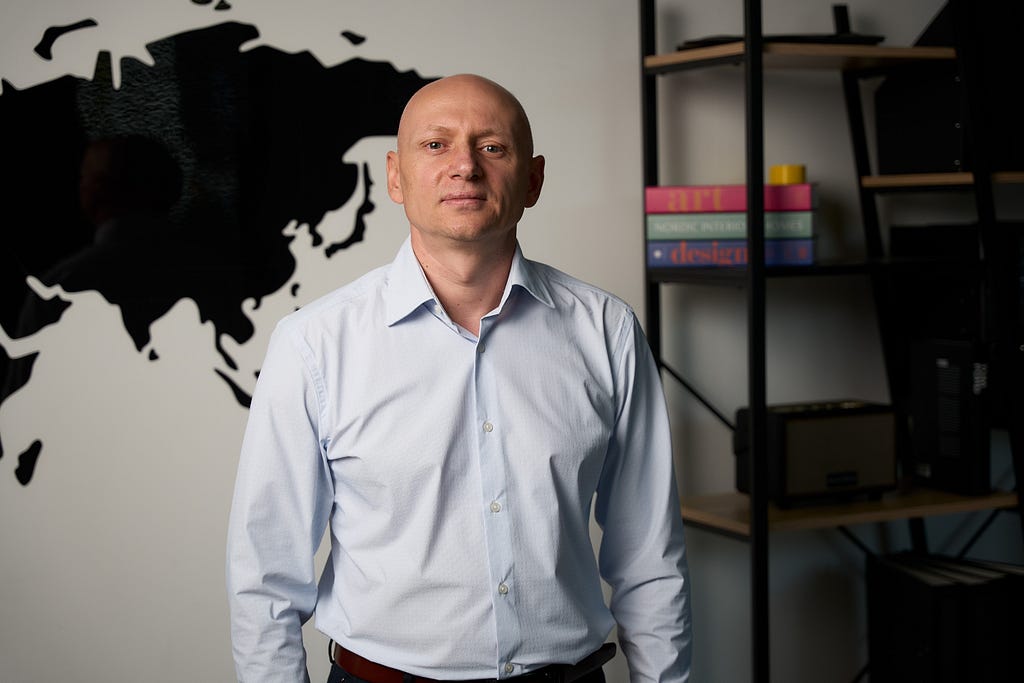Andrei Pahozhau of Mainsoft On Five Things You Need To Be A Highly Effective Leader During Uncertain & Turbulent Times

Avoiding the Bench — During a crisis, clients sometimes withdraw from projects involving multiple employees. This forces managers to make difficult decisions about layoffs because when times are tough, an IT company simply cannot afford to maintain a bench — essentially a group of backup players who are temporarily not engaged in commercial projects and do not generate profit. Maintaining such a bench can significantly impact profitability, which is crucial during a crisis. The responsibility for these decisions falls on the manager, and it is always a difficult ethical situation.
As part of our series about the “Five Things You Need To Be A Highly Effective Leader During Turbulent Times”, we had the pleasure of interviewing Andrei Pahozhau.
Andrei Pahozhau, based in Warsaw, Poland, is the Founder and CEO of Mainsoft LLC, a company that specializes in premium web and mobile product development, from ideation and strategy to engineering, launch, and support. With a wealth of experience from previous roles at Soft-Navigator, Andrei possesses a robust skill set that includes financial planning, business planning, digital transformation, software development, software project management, and more. His leadership at Mainsoft is driven by the commitment to delivering innovative software solutions that empower businesses and enhance operational efficiency.
Thank you so much for your time! I know that you are a very busy person. Our readers would love to “get to know you” a bit better. Can you tell us a bit about your ‘backstory’ and how you got started?
Thank you so much for this opportunity! I began my career as a junior developer. Over time, I advanced to a senior developer role, led teams, and eventually managed projects. With this wealth of experience, I decided it was time to venture out on my own and founded Mainsoft.
Our journey commenced with a project aimed at streamlining document management for a large enterprise. We automated the workflows, making it incredibly easy to find and manage documents. This successful initiative opened doors to new partnerships with companies in healthcare, fintech, and edtech, where we’ve delivered tailored solutions to address their unique challenges.
It has been said that our mistakes can be our greatest teachers. Can you share a story about the funniest mistake you made when you were first starting? Can you tell us what lesson you learned from that?
One of my biggest mistakes as a leader was attempting to engender professional growth of employees who lacked the motivation to improve. I provided some developers with opportunities they weren’t equipped to handle and assigned projects to project managers without the necessary experience. Ultimately, I had to redo everything myself. The crucial lesson I learned was the importance of delegating the tasks to the right people. Rather than trying to change individuals, it’s better to find employees who share your values, are eager to grow, and can manage challenging assignments.
None of us are able to achieve success without some help along the way. Is there a particular person who you are grateful towards who helped get you to where you are? Can you share a story?
I believe that everyone has such “guardian angels” along the way, but it would be tough for me to choose a single person. That said, I want to thank all the members of the Mainsoft team. Without their hard work, we wouldn’t be here today.
Extensive research suggests that “purpose-driven businesses” are more successful in many areas. When your organization started, what was its vision, what was its purpose?
Our mission has been clear from the outset: to provide our clients with exceptional service, deliver high-quality projects on schedule, and work alongside the finest team in business.
Thank you for all that. Let’s now turn to the main focus of our discussion. Can you share with our readers a story from your own experience about how you lead your team during uncertain or difficult times?
Crises are an inevitable part of both business and life. No enterprise can expect to sail through every obstacle unscathed. This means that leaders must always be prepared for the next challenge, even when everything seems to be going smoothly.
Nothing beats the support that one’s team can provide in times of uncertainty and hardship, so it’s vital to surround yourself with people who share your values. Honest communication with employees is paramount during such periods. The entire team should have a clear understanding of the company’s direction, goals, and the way forward.
I see crisis situations as opportunities for growth. Mainsoft faced one of its most challenging periods in 2021–2022. We had to navigate a global crisis, which forced us to lay off part of our team and cut expenses. But we used these difficulties as a catalyst for improvement and emerged stronger by reexamining our values, marketing strategies, approach to sales, and employee relations.
Did you ever consider giving up? Where did you get the motivation to continue through your challenges? What sustains your drive?
To tell you the truth, I have never considered giving up. Entrepreneurs and business leaders constantly face challenges, and I approach these situations rationally rather than emotionally. While there’s certainly a level of stress involved, I don’t let my emotions dictate my actions. Instead, I analyze problems, seek solutions, and develop new plans.
What drives me? I’m always curious about what comes next. This curiosity keeps me motivated to overcome the obstacles. After all, you never know until you try — and if you give up, there’s that permanent mystery of what could have been. My responsibility to my company and my team is another thing that keeps me going. When you have 70 people relying on you, quitting is simply not an option.
I’m an author and I believe that books have the power to change lives. Do you have a book in your life that impacted you and inspired you to be an effective leader? Can you share a story?
There are two books on my shelf that have really resonated with me: Atlas Shrugged by Ayn Rand and the biography of Steve Jobs by Walter Isaacson. These books have profoundly impacted my perspective, and I believe every IT leader, or anyone aspiring to be one, should read them.
What would you say is the most critical role of a leader during challenging times?
I believe that in times of crisis, a leader must step up and make the tough decisions. When a team is struggling to navigate difficult choices, it falls to one person to take the reins. A leader must be able to manage stress, take risks, and accept responsibility for their actions.
When the future seems so uncertain, what is the best way to boost morale? What can a leader do to inspire, motivate and engage their team?
It’s important to recognize that motivation can grow weaker even when things are going well — it needs to be nurtured consistently. I find that detailed plans and involving the team as much as possible in the planning process significantly reduce uncertainty within the company.
With a clear plan, everyone knows the final goal. Having a well-defined goal is incredibly motivating as it provides a sense of direction and purpose.
It is also essential to support the employees’ personal growth and maintain open communications. Because conflicts within teams can greatly diminish the overall morale, I strive to be proactive in this regard, working to prevent and resolve them before it’s too late. This is especially crucial in the times of crisis when stress levels are already high.
What is the best way to communicate difficult news to one’s team and customers?
I believe in being upfront and honest. During a crisis, working conditions and the market are constantly evolving. As a leader, the best approach is to analyze the situation, communicate openly with your team, propose a plan of action, and be receptive to feedback.
Delivering news about layoffs or other difficult decisions is never easy, but it’s a necessary part of a leader’s role. It’s important to view these challenges as stepping stones towards a better future for the company. As I’ve mentioned before, a crisis can present an opportunity to become a better version of yourself and improve company processes.
How can a leader make plans when the future is so unpredictable?
I always develop plans based on past experience and current trends. Planning should be an ongoing process, not just something that happens during a crisis. To deal with uncertainty, I create multiple strategic plans for the year ahead: pessimistic, realistic, and optimistic.
By considering all the possible situations, you are prepared for any eventuality, even the worst-case scenario. This enables you to make informed decisions based on whichever plan is unfolding.
This approach ensures that an unexpected crisis doesn’t feel like a catastrophe. The optimistic scenario becomes just one potential outcome, albeit a desirable one. In fact, in 2023, we were fortunate to see our optimistic plan come to life.
Is there a “number one principle” that can help guide a company through the ups and downs of turbulent times?
The most critical factor in navigating a crisis is having the right people on your team. A company’s ability to weather a storm and stay afloat hinges entirely on this condition.
That’s why my primary principle is to use the interview process to find individuals who share Mainsoft’s values right from the start. Once they’re onboard, we work together to set both short-term and long-term goals.
Can you share 3 or 4 of the most common mistakes you have seen other businesses make during difficult times? What should one keep in mind to avoid that?
I can’t say that I closely study how other companies handle their challenges, as each organization’s situation is unique. Therefore, I prefer to focus on my own experiences and learn from my mistakes. By analyzing past situations, I aim to forecast future ones.

Here is the primary question of our discussion. Based on your experience and success, what are the five most important things a business leader should do to lead effectively during uncertain and turbulent times? Please share a story or an example for each.
Based on my experience, I would highlight five key recommendations for business leaders during a crisis:
. Strategic Planning
As I mentioned earlier, it’s vital to develop various strategic plans for the coming year or more, including the most pessimistic scenarios.
- Doing Everything Possible to Remain Profitable
In times of crisis, you can never guarantee that clients won’t start pulling out of projects. This is something to always keep in mind when calculating profitability. If a company is already in the red and another client cancels a project, the losses can snowball, which must be avoided at all costs.
- Letting Go of Outdated Sales Tools
For instance, if a particular sales channel used to work well but has stopped yielding results during the crisis, it’s unwise to invest more money into it, as this could further drag the company down. It’s essential to reassess your approach and find new tools and sales channels. In times of crisis, it’s important to be quick on your feet and adapt to new conditions
- Reducing Expenses
This principle follows from the previous one. During a crisis, companies need to reassess all positions and analyze which roles can be eliminated. The goal should be to minimize overall expenses as much as possible to reduce the risk of operating at a loss.
- Avoiding the Bench
During a crisis, clients sometimes withdraw from projects involving multiple employees. This forces managers to make difficult decisions about layoffs because when times are tough, an IT company simply cannot afford to maintain a bench — essentially a group of backup players who are temporarily not engaged in commercial projects and do not generate profit. Maintaining such a bench can significantly impact profitability, which is crucial during a crisis. The responsibility for these decisions falls on the manager, and it is always a difficult ethical situation.
Can you please give us your favorite “Life Lesson Quote”? Can you share how that was relevant to you in your life?
My favorite quotes change yearly, so it’s hard to pick just one. I’m really drawn to Steve Jobs’ philosophy that “The only way to do great work is to love what you do.”
How can our readers further follow your work?
Discover what Mainsoft is up to by connecting with us on LinkedIn and visiting our website.
Thank you so much for sharing these important insights. We wish you continued success and good health!
Andrei Pahozhau of Mainsoft On Five Things You Need To Be A Highly Effective Leader During… was originally published in Authority Magazine on Medium, where people are continuing the conversation by highlighting and responding to this story.
